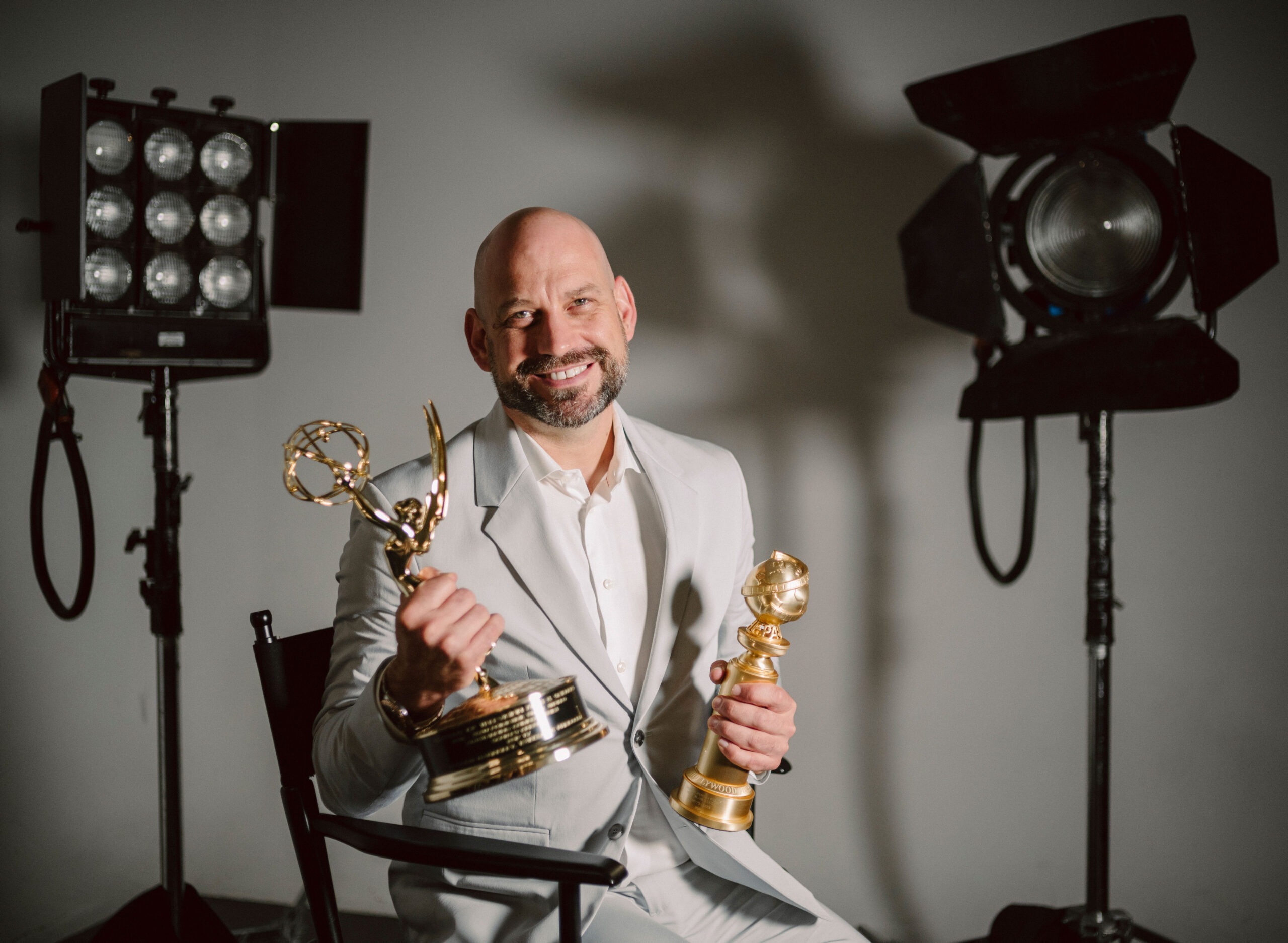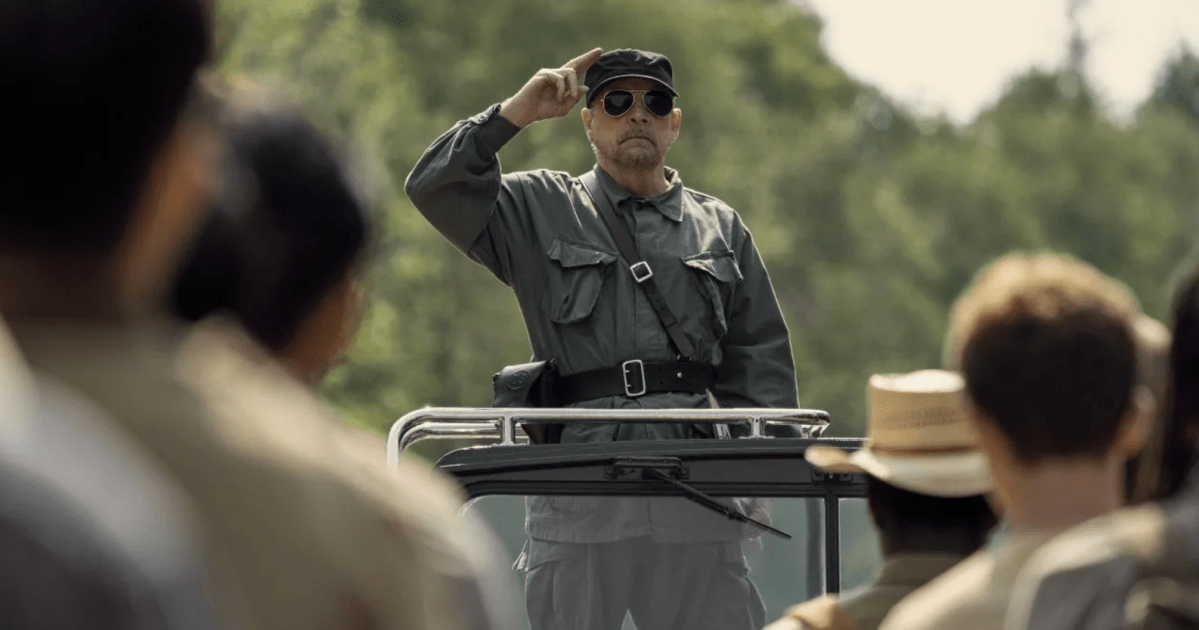Happy National Canadian Film Day! Hope you’ve checked out some good ones this year, and if you need a break then read this article here. Today is not just about watching movies but giving us film types the recognition we deserve. Speaking of film types, I recently decided to reconnect with someone I interviewed 2 years ago, Andrew Barnsley. The last time we talked, it was about what Hollywood North should be better known as. To this day, the name still stays, and even the poll I put up has barely been touched. Otherwise, I would’ve changed the name of the site and/or bought a completely different domain. But if you have an idea, vote below.
Now that that’s out of the way, it’s time to get back to talking with Andrew. He’s one of the greatest in Toronto with two jobs: TV producer and President of Toronto Film School. He has already won an Emmy and a Golden Globe Award for his role as executive producer on Schitt’s Creek and has won and been nominated for a Canadian Screen Award 8 times for the shows he helped made. Not just Schitt’s Creeek, but also Jan and Spun Out. Lately Canada’s film industry has been progressing intensely, and the stories coming out are something else. Andrew and I spoke on a variety of topics, so if you need to stop looking at moving pictures for a while, go right ahead with looking at some text for a while. There will always be another screener by the time you’re done.
HNMAG: It’s been a while since we’ve chatted, how has the name change gone regarding Canada’s film industry?
Andrew Barnsley: I haven’t really thought too much about that since then, I don’t think anything’s really changed. I think people still refer to it as Hollywood North. When we were playfully pitching new ideas, we haven’t been able to get any traction on that new name. It really feels like Hollywood North is one that people are familiar with and comfortable with.
HNMAG: What else have you been doing businesswise in helping out the Canadian film industry?
Andrew Barnsley: Yeah well, as you know, I wear two hats. I am a televison producer, so since we spoke last, my production company has been developing a handful of television series. We sought and delivered the 4th season of Son of a Critch for CBC, and that’s been good. I’ve been attending industry events around the world, I’ve been to domestic events, such as TIFF, the Kingston Canadian Film Festival, to the Red City Film Festival in Saudi Arabia. I’ve been to Content London, which is a television marketplace for Global Television in the UK, and just last month I came back from Series Mania, which is a television festival in France. I’ve also been exploring trends in production financing around the world, looking at ways to build international partnerships. Look at taking advantage of International co-production treaties that Canada has with different countries around the world. The advantage of Treaty Co productions is that it’s a way for two jurisdictions to work together to take advantage of the financial and labour resources both those jurisdictions have to create global television and film so that’s something I’m very interested in. Then on top of that, at Toronto Film School we’ve been working very hard to make sure that the experiences have really prepare them for the present industry. In the last 6-8 months, we’ve done some very meaningful initiatives. The first being that I’ve made sure there’s an upgrade to our camera equipment for students. We’ve invested 2 million dollars to have new camera and gear to make sure students are working with state-of-the-art technology that is being used on sets around the world.
Andrew also went on to explain about where AI fits into film and TV, so Toronto Film School has brought in a director of AI, who is somebody that makes sure that all programs and courses for students have access to the latest greatest technology. Seeing as AI is going to be used as a tool for storytelling, and the students will need skills in AI once they graduate and make it to the workforce. I had to know a little more about that.
HNMAG: How do you teach the students to use AI properly for such purposes?
Andrew Barnsley: The AI director is doing a pass of all the ciriculum to make sure that it’s fit forward and the proper tools and software are used. One thing I can tell you just from a philosophical point of view is we believe that AI has a very meaningful place in the world of filmmaking and creative industires. The last thing we want to be doing is resisting this, we want to make sure that Tonronto Film School is a leader and embracing it. We’re making sure that our students recognize it as a tool and work with it as opposed to work against it. Our director of AI is tracking future trends to make sure that when we’re thinking and strategizing about the industry, that the proper skillsets are being formatted and developed for our students.
HNMAG: And have there been a lot of outstanding projects lately?
Andrew Barnsley: This is still relatively new, but I can tell you our video game courses have been using AI in sort of early iterations for a number of years. The school’s been quite successful and the students are quite successful in the video games program. Student projects are being award-winning at various festivals around the Greater Toronto Area. These are students that are trained in conventional video game programming, mentioning technology but also incoporating AI into their classroom’s work as well.
HNMAG: What about film projects? How have those been?
Andrew Barnsley: We’re definitely seeing this too with our investment in the new film and camera equipment. That really leveled up our student’s experience so they have access to technology and cameras. Lighting and grip equipment that they’ve never had access to before, and that is certainly showing up on the screen. It’s been a real shift in the access but a cultural shift as well, so we’ve really shifted the school and raised the bar on production value, but expectations are around projects and we’re definitely seeing that in our student’s films.
It was great learning about the upgrades for Toronto Film School, but since today is National Canadian Film Day, I had to ask him some questions about Canadian films.
HNMAG: Why are Canadian stories so important for global audiences to watch?
Andrew Barnsley: That’s a really good and very important question, and I think now more than ever, stories are what unite a country and what unite people and a voice, and I think now more than ever, in light of all the conversations from the south around 51st states, Canada being a 51st state. That has really brought the country together, and when you think about what actually brings a country together, it’s culture and what is culture? Culture is stories, music, the creativity, and being in the creative and cultural industries, you realize now more than ever, the importance of this. Not just domestically Canadians, and tell our stories but also showing our stories around the world. I think just in the past couple of months, we really as Canadians recognize the importance of this. We actually kind of lost sight of the value and there’s been a lot of conversations around defunding very important cultural institutions now. Are they perfect? No, but it almost takes a crisis in sovereignty in a place like this for people to come togther and say “Who are we? What are we fighting for?” and what it comes down to is the heart and soul of Canada, and where we see that more than anything in the stories we tell in television, music, and literature. This is why I think it’s incredibly important. I’ve been taking some time around National Canadian Film Day just to reflect on some of the Canadian movies that have meant a lot to me but also what it means to the world. I take a lot of pride in Canadian films that have travelled, and as a producer, I’ve a real commitment to telling our stories, and making sure that Canada’s represented on the global stage. As the president of Toronto Film School, you know we’re training the next generation of storytellers and we want to make sure they’re learning the importance of that as well. It’s nice to have a moment like National Canadian Film Day and reflect on the importance of film and our stories.
HNMAG: How has the Canadian Film industry been performing lately? Have you seen many amazing updates?
Andrew Barnsley: We certainly see in terms of the film and television production industry, the numbers speak for themselves. I think it’s a 14 billion dollar industry in Canada and that is a massive economic engine with almost a quarter of a million Canadians employed in film and television. 80,000 of those exist solely to produce Canadian content, so these are massive numbers. I feel there’s a lot of interest in Canada, but due to political climate south of the border, and also we can point to some successes internationally in television and film of our productions finding global audiences. It’s an interesting time to be in Canadian television, I think anybody considering entering will get massive opportunities and the world is looking to work with Canadians.
HNMAG: What can we do to keep the spirit of Canadian movies and the systems that support it alive?
Andrew Barnsley: I think we’re here at a very interesting moment as Canadians. We strongly feel a threat to our sovereignty, we’ve never felt that before. This is coming into a federal election, I think when people go to the voting booth, they’re going to be spending some time thinking about what it means to be Canadian. Particularly in light of that threat, and the rhetoric that’s been out there around Canada. I think that’s important, a lot of it has to start with the political will and the will of the people to be creating Canadian content and stories and I see that’s happening. It’s united a lot of us, and I think a lot of people will recognize the importance of funding Canadian television and films. It’s not just for Canadians to consume Canadian stories, it’s for the benefit of cultural expectation which means getting Canadian stories to the rest of the world. We’ve got amazing stories to tell, that have impacted the world.
HNMAG: You also mentioned meeting a lot of storytellers. Do a lot of them tell cultural stories of their heritage?
Andrew Barnsley: I spend a lot of time with writers, creators, show writers, and a lot of them don’t come in wanting to tell specific historic Canadian stories. By virtue of lived the Canadian experience, everything that these talent write and create is through the Canadian lands. Those are the stories I want to support both as a producer and president of Toronto Film School. I don’t think the message is we want to just be putting out historical drama, we want to just be telling stories that reasonate with Canadians. Look at Kim’s Convenience, that’s a great example of a Canadian contemporary story. Workin’ Moms, and Son of a Critch, these are deeply Canadian but also series that travel around the world. I think that’s what we should be highlighting.

He listed some more examples like LetterKenny, Office Movers, and One More Time. Stories like this tell a Canadian story through Canadian land that aren’t really heavy handed on being Canadian. I had to ask him about movies after we discussed so much on Canadian TV shows.
HNMAG: Lets’ talk about some of your personal favourites. What makes Blackberry, Strange Brew, and Hard Core Logo stand out to you?
Andrew Barnsley: Blackberry was a movie that was a massive hit by Canadian standards and told a very specific Canadian story but was also a global story. Strange Brew for me, I have a deep connection with so many of the cast members. That’s a legacy that Canada should be very proud of, I’m actually friends with Dave Thomas who was part of Bob and Doug McKenzie and I just get great joy thinking of how these two “Canadian Hosers” had such broad reach across the world and really made some entertainment for global audeicnes so that’s pretty cool and kind of special. Hard Core Logo is a low budget punk rock movie that showed that Canadians had a real edge when it came to filmmaking. We could get messy, and do it in an entertaining way. It doesn’t feel sort of cliincally Canadian, I just like that sort of edge to set the tone for movies that came afterwards willing to take risks, not feel that budget size had to limit your creativity.
HNMAG: And are there any other favourites that you have? If so, why?
Andrew Barnsley: I’ve always been a fan of Atom Egoyan. The Sweet Hereafter is an amazing movie, Dawn McKellar’s Last Night is one of my favourites. Mike Dallas, and of course David Cronenberg made some great movies. Yeah, the thing that’s great about Canadian movies is that they don’t have the same marketing budget that an American film studio will have. I always find myself being surprised by Canadian movies. You tend not to know a lot foing into them, and then they just kind of surprise you. The level of talent both onscreen and off, is really remarkable in Canada. I find the depth of talent is really surprising. I encourage people to go explore and see what’s out there in Canadian filmmaking.
Andrew really talks on these subjects and I wish we had more time to chat, but I was super busy. With the way things are going, I might have to go to Toronto one day and meet the guy. I’m sure we’d have the most entertaining conversation over coffee that we’d be there until closing time. In the meantime, there’s probably another free screening nearby, so check your local theatre listings and watch another one of those stories. Or check your streaming services for some of Andrew’s favourites. If you watch them, you might see them from his perspective.





